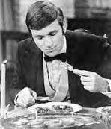Franklin Delano Roosevelt (January 30, 1882 – April 12, 1945), commonly known as FDR, was an American politician who served as the 32nd president of the United States from 1933 until his death. He was a member of the Democratic Party and is the only U.S. president to have served more than two terms. His initial two terms were centered on combating the Great Depression, while his third and fourth saw him shift his focus to America's involvement in World War II.
A member of the Delano family and Roosevelt family, after attending university, Roosevelt began to practice law in New York City. He was elected a member of the New York State Senate from 1911 to 1913 and was then the assistant secretary of the Navy under President Woodrow Wilson during World War I. Roosevelt was James M. Cox's running mate on the Democratic Party's ticket in the 1920 U.S. presidential election, but Cox lost to Republican nominee Warren G. Harding. In 1921, Roosevelt contracted a paralytic illness that permanently paralyzed his legs. Partly through the encouragement of his wife, Eleanor Roosevelt, he returned to public office as governor of New York from 1929 to 1933, during which he promoted programs to combat the Great Depression. In the 1932 presidential election, Roosevelt defeated Republican president Herbert Hoover in a landslide.
During his first 100 days as president, Roosevelt spearheaded unprecedented federal legislation and directed the federal government during most of the Great Depression, implementing the New Deal in response to the most significant economic crisis in American history. He also built the New Deal coalition, realigning American politics into the Fifth Party System and defining American liberalism throughout the mid-20th century. He created numerous programs to provide relief to the unemployed and farmers while seeking economic recovery with the National Recovery Administration and other programs. He also instituted major regulatory reforms related to finance, communications, and labor, and presided over the end of Prohibition. In 1936, Roosevelt won a landslide reelection with the economy having improved from 1933, but the economy relapsed into a deep recession in 1937 and 1938. He was unable to expand the Supreme Court in 1937, the same year the conservative coalition was formed to block the implementation of further New Deal programs and reforms. Major surviving programs and legislation implemented under Roosevelt include the Securities and Exchange Commission, the National Labor Relations Act, the Federal Deposit Insurance Corporation, and Social Security. In 1940, he ran successfully for reelection, becoming the only American president to serve for more than two terms.
With World War II looming after 1938 in addition to the Japanese invasion of China and the aggression of Nazi Germany, Roosevelt gave strong diplomatic and financial support to China, the United Kingdom, and the Soviet Union, while the U.S. remained officially neutral. Following the Japanese attack on Pearl Harbor on December 7, 1941, he obtained a declaration of war on Japan, Germany, and Italy. He worked closely with other national leaders in leading the Allies against the Axis powers. Roosevelt supervised the mobilization of the American economy to support the war effort and implemented a Europe first strategy. He also initiated the development of the first atomic bomb and worked with the other Allied leaders to lay the groundwork for the United Nations and other post-war institutions, even coining the term "United Nations". Roosevelt won reelection in 1944 but died in 1945 after his physical health seriously and steadily declined during the war years. Since then, several of his actions have come under substantial criticism, including his ordering of the internment of Japanese Americans in concentration camps. Nonetheless, historical rankings consistently place him as one of the greatest American presidents.
Franklin Delano Roosevelt was born on January 30, 1882, in the Hudson Valley town of Hyde Park, New York, to businessman James Roosevelt I and his second wife, Sara Ann Delano. His parents, who were sixth cousins,[3] came from wealthy, established New York families—the Roosevelts, the Aspinwalls and the Delanos, respectively. Roosevelt's paternal ancestor migrated to New Amsterdam in the 17th century, and the Roosevelts succeeded as merchants and landowners. The Delano family patriarch, Philip Delano, traveled to the New World on the Fortune in 1621, and the Delanos thrived as merchants and shipbuilders in Massachusetts. Franklin had a half-brother, James Roosevelt "Rosy" Roosevelt, from his father's previous marriage.
Roosevelt's father, James, graduated from Harvard Law School in 1851 but chose not to practice law after receiving an inheritance from his grandfather. James, a prominent Bourbon Democrat, once took Franklin to meet President Grover Cleveland, who said to him: "My little man, I am making a strange wish for you. It is that you may never be President of the United States." Franklin's mother, the dominant influence in his early years, once declared, "My son Franklin is a Delano, not a Roosevelt at all." James, who was 54 when Franklin was born, was considered by some as a remote father, though biographer James MacGregor Burns indicates James interacted with his son more than was typical at the time.
Marriage, family, and marital affairs
Eleanor and Franklin with their first two children, 1908During his second year of college, Roosevelt met and proposed to Boston heiress Alice Sohier, who turned him down. Franklin then began courting his childhood acquaintance and fifth cousin once removed, Eleanor Roosevelt, a niece of Theodore Roosevelt. In 1903, Franklin proposed to Eleanor. Following resistance from Roosevelt's mother, Franklin and Eleanor Roosevelt were married on March 17, 1905. Eleanor's father, Elliott, was deceased; Theodore, who was then president, gave away the bride. The young couple moved into Springwood. Franklin and Sara Roosevelt also provided a townhouse for the newlyweds in New York City, and Sara had a house built for herself alongside that townhouse. Eleanor never felt at home in the houses at Hyde Park or New York; however, she loved the family's vacation home on Campobello Island, which Sara also gave the couple. Burns indicates that young Franklin Roosevelt was self-assured and at ease in the upper class. On the other hands, Eleanor was then shy and disliked social life. Initially, Eleanor stayed home to raise their children. As his father had done, Franklin left childcare to his wife, and Eleanor delegated the task to caregivers. She later said that she knew "absolutely nothing about handling or feeding a baby." They had six children. Anna, James, and Elliott were born in 1906, 1907, and 1910, respectively. The couple's second son, Franklin, died in infancy in 1909. Another son, also named Franklin, was born in 1914, and the youngest, John, was born in 1916.
Roosevelt had several extramarital affairs. He commenced an affair with Eleanor's social secretary, Lucy Mercer, soon after she was hired in 1914. That affair was discovered by Eleanor in 1918. Franklin contemplated divorcing Eleanor, but Sara objected, and Mercer would not marry a divorced man with five children. Franklin and Eleanor remained married, and Franklin promised never to see Mercer again. Eleanor never forgave him for the affair, and their marriage shifted to become a political partnership. Eleanor soon established a separate home in Hyde Park at Val-Kill and devoted herself to social and political causes independent of her husband. The emotional break in their marriage was so severe that when Franklin asked Eleanor in 1942—in light of his failing health—to come live with him again, she refused. Roosevelt was not always aware of Eleanor's visits to the White House. For some time, Eleanor could not easily reach Roosevelt on the telephone without his secretary's help; Franklin, in turn, did not visit Eleanor's New York City apartment until late 1944.
Franklin broke his promise to Eleanor regarding Lucy Mercer. He and Mercer maintained a formal correspondence and began seeing each other again by 1941. Roosevelt's son Elliott claimed that his father had a 20-year affair with his private secretary, Marguerite LeHand. Another son, James, stated that "there is a real possibility that a romantic relationship existed" between his father and Crown Princess Märtha of Norway, who resided in the White House during part of World War II. Aides referred to her at the time as "the president's girlfriend", and gossip linking the two romantically appeared in newspapers.
In the afternoon of April 12, 1945, in Warm Springs, Georgia, while sitting for a portrait by Elizabeth Shoumatoff, Roosevelt said: "I have a terrific headache." He then slumped forward in his chair, unconscious, and was carried into his bedroom. The president's attending cardiologist, Howard Bruenn, diagnosed a massive intracerebral hemorrhage. At 3:35 p.m., Roosevelt died at the age of 63.
The following morning, Roosevelt's body was placed in a flag-draped coffin and loaded onto the presidential train for the trip back to Washington. Thousands flocked to the route to pay their respects. After a White House funeral on April 14, Roosevelt was transported by train from Washington to his birthplace at Hyde Park. On April 15 he was buried, per his wish, in the rose garden of his Springwood estate.
If you want to read a lot more, go here: https://en.wikipedia.org/wiki/Franklin_D._Roosevelt
- SERVES
- 8
- COOK TIME
- 1 Hr 45 Min
Need a little comfort that only "Mom" can provide? Well, you're sure to feel and taste lots of TLC in each spoonful of our Test Kitchen's classic soothing Mom's Chicken Soup.
- 1 (3- to 4-pound) chicken, cut into quarters
- 4 quarts water
- 3 carrots, cut into chunks
- 3 celery stalks, cut into chunks
- 2 onions, cut into chunks
- 1 teaspoon salt
- 1/2 teaspoon black pepper
- Chicken base or bouillon cubes to taste, optional (see Notes)
- Rinse chicken under cold running water. In a soup pot over medium-high heat, combine all ingredients except chicken base; bring to a boil.
- Reduce heat to low and simmer about 1-1/2 hours, or until chicken falls off bones. Cool slightly, then separate chicken from bones, discarding bones. Return chicken pieces to soup. Add chicken base, if desired, and stir until completely dissolved.
Celebration of Life Day on January 22nd honors the children and grandchildren who bring joy to our lives. The day is a reminder that each child and each life is to be held as a precious gift with the highest respect and dignity.
Children grow up so quickly. They’re constantly learning new things and changing daily. Each day they delight us with their simple wisdom and observations. By spending time with children and demonstrating the care and love they deserve, we celebrate their life.
HOW TO OBSERVE
Celebrate the children in your life. Share the day with a child, grandchild, niece or nephew. We’ve provided several suggestions.
- Read a book with a child.
- Get down on the floor and put a puzzle together.
- Build something with your child.
- Invite all the cousins to play board games.
- Bake cookies and decorate them. Even the smallest child will learn something.
- Make popcorn and watch a movie.
- Tell the story of how Grandma and Grandpa met.
- Get out the art supplies and create.
- Visit a museum.
- Show a teen how to change a tire.
- Give a driving lesson.
- Paint your fingernails together.
- Everybody give the dog a bath.
- Go swimming.
- Make balloon animals.
- Sing Karaoke
























